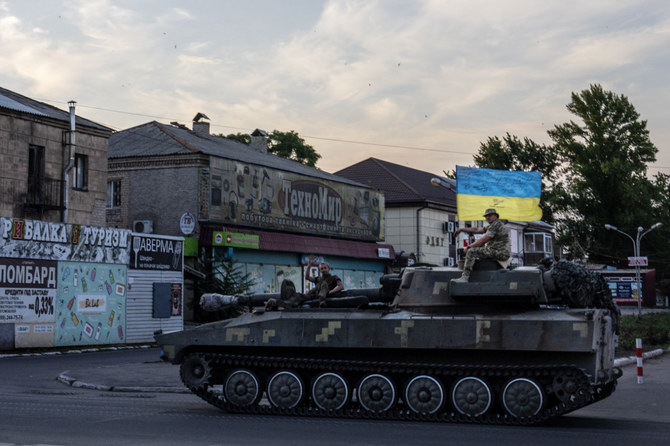KYIV: Ukraine urged its allies on Friday to send more weapons as its forces dug in to slow Russia’s military advance through the eastern Donbas region, while a belligerent Moscow warned Western nations of consequences for their reprisals over its invasion.
Signalling that the Kremlin was in no mood for compromise, President Vladimir Putin said continued use of sanctions against Russia risked causing “catastrophic” energy price rises
Putin’s top diplomat Sergei Lavrov clashed with his Western counterparts at a Group of 20 meeting, where they urged Russia to allow Kyiv to ship blockaded Ukrainian grain out to an increasingly hungry world.
Meanwhile, Moscow’s envoy to London offered little prospect of a pull-back from parts of Ukraine under Russian control.
Ambassador Andrei Kelin told Reuters that Russian troops would capture the rest of Donbas and were unlikely to withdraw from land across the southern coast.
Ukraine would eventually have to strike a peace deal or “continue slipping down this hill” to ruin, he said.
On the Donbas frontlines, Ukrainian officials reported Russian shelling of towns and villages ahead of an anticipated push for more territory.
A Ukrainian infantry unit on the road to the town of Siversk, whose members spoke to Reuters, had set up positions on the edge of a deep earth bunker covered with logs and sandbags and defended by machine guns.
’Scorched earth tactics’
On Thursday, Putin had indicated that current prospects of finding a solution to the conflict were dim, saying Russia’s campaign in Ukraine had barely started.
Ambassador Kelin’s remarks gave an insight into Russia’s potential endgame — a forced partition that would leave its former Soviet neighbor shorn of more than a fifth of its post-Soviet territory.
“We are going to liberate all of the Donbas,” Kelin said.
“Of course it is difficult to predict the withdrawal of our forces from the southern part of Ukraine because we have already experience that after withdrawal, provocations start.”
An escalation of the war was possible, he added.
Ukrainian officials, echoing comments by the deputy commander of the infantry unit outside Siversk, said they needed more high-grade Western weapons to shore up the their defenses.
Oleksiy Danilov, secretary of the National Security and Defense Council, said Ukraine still did not have enough Western weapons and soldiers needed time to adapt to using them.
Kyiv has attributed battlefield successes to last month’s arrival of US-made High Mobility Artillery Rocket Systems (HIMARS).
“When they came in, the Russian war machine could instantly feel its effect,” Danilov told Reuters. But more Western military aid was vital.
President Volodymyr Zelensky’s chief of staff also urged the West to send more heavy weapons to counter what he called Russia’s “scorched earth tactics.”
“With a sufficient number of howitzers, SPG and HIMARS, our soldiers are able to stop and drive the invaders from our land,” Andriy Yermak wrote on Twitter.
’Not your country’
At the G20 meeting in Bali, Indonesia, some of the staunchest critics of the invasion that began on Feb. 24 confronted Lavrov.
High on their list of concerns was getting grain shipments from Ukraine out through ports blocked by Russia’s presence in the Black Sea and naval mines. Ukraine is a leading exporter and aid agencies have warned that many developing countries face devastating food shortages if supplies fail to reach them.
US Secretary of State Antony Blinken urged Moscow to let Ukrainian grain out, a Western official said.
“He addressed Russia directly, saying: ‘To our Russian colleagues: Ukraine is not your country. Its grain is not your grain. Why are you blocking the ports? You should let the grain out,’” the official said.
A US State Department official later said Blinken had told the meeting that, if the G20 was to remain relevant, it must hold Russia accountable for its actions in Ukraine.
Earlier, Lavrov had berated the West, saying that instead of focusing on how to tackle global economic problems, ministers had embarked on “frenzied criticism” of Russia over Ukraine.
The meeting’s host, Indonesian Foreign Minister Retno Marsudi, said repercussions of the war would hit poor countries the hardest and it was critical to bring Ukraine and Russia’s grain and fertilizer back into supply chains.
’Dying in houses’
The biggest conflict in Europe since World War Two has killed thousands, displaced millions and flattened Ukrainian cities.
Russia calls it a “special military operation” intended to degrade Ukraine’s military and root out people it sees as dangerous nationalists. Ukraine and its Western allies say Russia is engaged in an unprovoked land grab.
Russian forces have seized a big chunk of territory across Ukraine’s southern flank and are waging a war of attrition in the Donbas, the eastern industrial heartland made up of Luhansk and Donetsk provinces.
Luhansk’s governor said Russian forces were indiscriminately shelling populated areas on Friday.
“They are not stopped even by the fact that civilians remain there, dying in houses and yards,” Serhiy Gaidai he said.
Reuters could not independently verify battlefield accounts.



























